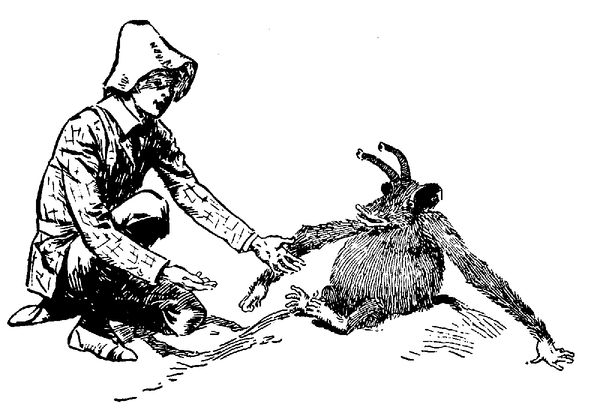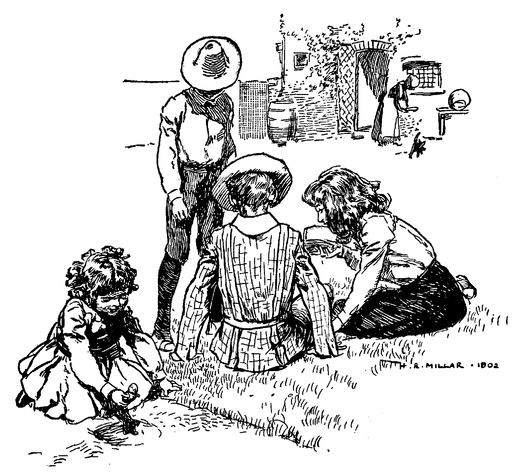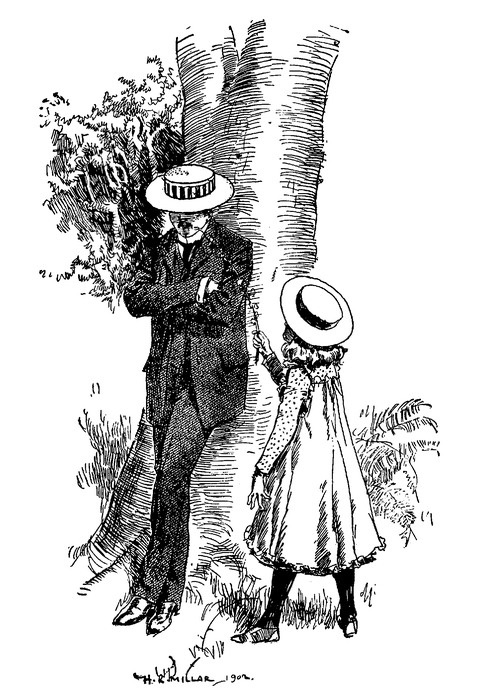Enchanted Castle and Five Children and It (Barnes & Noble Classics Series) (24 page)
Read Enchanted Castle and Five Children and It (Barnes & Noble Classics Series) Online
Authors: Edith Nesbit
And Jane and Anthea went.
“We’re going home,” they said to Bill. “We’re leaving the giant with you. Be kind to him.” And that, as Anthea said afterwards, was very deceitful, but what were they to do?
When they had gone, Cyril went to Bill.
“Look here,” he said, “he wants some ears of corn—there’s some in the next field but one. I’ll just run and get it. Oh, and he says can’t you loop up the tent at the back a bit? He says he’s stifling for a breath of air. I’ll see no one peeps in at him. I’ll cover him up, and he can take a nap while I go for the corn. He
will
have it—there’s no holding him when he gets like this.”
will
have it—there’s no holding him when he gets like this.”
The giant was made comfortable with a heap of sacks and an old tarpaulin. The curtain was looped up, and the brothers were left alone. They matured their plan in whispers. Outside, the merry-go-round blared out its comic tunes, screaming now and then to attract public notice.
Half a minute after the sun had set, a boy in a Norfolk suit came out past Bill.
“I’m off for the corn,” he said, and mingled quickly with the crowd.
At the same instant a boy came out of the back of the tent past ’Becca, posted there as sentinel.
“I’m off after the corn,” said this boy also. And he, too, moved away quietly and was lost in the crowd. The front-door boy was Cyril; the back-door was Robert—now, since sunset, once more his proper size. They walked quickly through the field, and along the road, where Robert caught Cyril up. Then they ran. They were home as soon as the girls were, for it was a long way, and they ran most of it. It was indeed a
very
long way, as they found when they had to go and drag the pony-trap home next morning, with no enormous Robert to wheel them in it as if it were a mail-cart, and they were babies and he was their gigantic nursemaid.
very
long way, as they found when they had to go and drag the pony-trap home next morning, with no enormous Robert to wheel them in it as if it were a mail-cart, and they were babies and he was their gigantic nursemaid.
I cannot possibly tell you what Bill and ’Becca said when they found that the giant had gone. For one thing, I do not know.
CHAPTER IX
GROWN UP
C
yril had once pointed out that ordinary life is full of occasions on which a wish would be most useful. And this thought filled his mind when he happened to wake early on the morning after the morning after Robert had wished to be bigger than the baker’s boy, and had been it. The day that lay between these two days had been occupied entirely by getting the governess-cart home from Benenhurst.
yril had once pointed out that ordinary life is full of occasions on which a wish would be most useful. And this thought filled his mind when he happened to wake early on the morning after the morning after Robert had wished to be bigger than the baker’s boy, and had been it. The day that lay between these two days had been occupied entirely by getting the governess-cart home from Benenhurst.
Cyril dressed hastily; he did not take a bath, because tin baths are so noisy, and he had no wish to rouse Robert, and he slipped off alone, as Anthea had once done, and ran through the dewy morning to the sand-pit. He dug up the Psammead very carefully and kindly, and began the conversation by asking it whether it still felt any ill effects from the contact with the tears of Robert the day before yesterday. The Psammead was in a good temper. It replied politely.
“And now, what can I do for you?” it said. “I suppose you’ve come here so early to ask for something for yourself, something your brothers and sisters aren’t to know about, eh? Now, do be persuaded for your own good! Ask for a good fat Megatherium and have done with it.”
“Thank you—not today, I think,” said Cyril cautiously. “What I really wanted to say was—you know how you’re always wishing for things when you’re playing at anything?”
“I seldom play,” said the Psammead coldly
“Well, you know what I mean,” Cyril went on impatiently. “What I want to say is: won’t you let us have our wish just when we think of it, and just where we happen to be? So that we don’t have to come and disturb you again,” added the crafty Cyril.
“It’ll only end in your wishing for something you don’t really want, like you did about the castle,” said the Psammead, stretching its brown arms and yawning. “It’s always the same since people left off eating really wholesome things. However, have it your own way. Good-bye.”
Ask for a good fat Megatherium and have done with it

“Good-bye,” said Cyril politely.
“I’ll tell you what,” said the Psammead suddenly, shooting out its long snail’s eyes—“I’m getting tired of you—all of you.You have no more sense than so many oysters. Go along with you!”
And Cyril went.
“What an awful long time babies stay babies,” said Cyril after the Lamb had taken his watch out of his pocket while he wasn’t noticing, and with coos and clucks of naughty rapture had opened the case and used the whole thing as a garden spade, and when even immersion in a wash-hand basin had failed to wash the mould from the works and make the watch go again. Cyril had said several things in the heat of the moment; but now he was calmer, and had even consented to carry the Lamb part of the way to the woods. Cyril had persuaded the others to agree to his plan, and not to wish for anything more till they really did wish it. Meantime it seemed good to go to the woods for nuts, and on the mossy grass under a sweet chestnut-tree the five were sitting. The Lamb was pulling up the moss by fat handfuls, and Cyril was gloomily contemplating the ruins of his watch.
“He does grow,” said Anthea. “Doesn’t oo, precious?”
“I suppose he’ll be grown up some day”

“Me grow,” said the Lamb cheerfully—“me grow big boy, have guns an’ mouses—an’—an’ ...” Imagination or vocabulary gave out here. But anyway it was the longest speech the Lamb had ever made, and it charmed everyone, even Cyril, who tumbled the Lamb over and rolled him in the moss to the music of delighted squeals.
“I suppose he’ll be grown up some day,” Anthea was saying, dreamily looking up at the blue of the sky that showed between the long straight chestnut-leaves. But at that moment the Lamb, struggling gaily with Cyril, thrust a stoutly-shod little foot against his brother’s chest; there was a crack!—the innocent Lamb had broken the glass of father’s second-best Waterbury watch,
by
which Cyril had borrowed without leave.
by
which Cyril had borrowed without leave.
“Grow up some day!” said Cyril bitterly, plumping the Lamb down on the grass. “I daresay he will—when nobody wants him to. I wish to goodness he would—”
“Oh, take care!” cried Anthea in an agony of apprehension. But it was too late—like music to a song her words and Cyril’s came out together—
Anthea—“Oh, take care!”
Cyril—“Grow up now!”
The faithful Psammead was true to its promise, and there, before the horrified eyes of its brothers and sisters, the Lamb suddenly and violently grew up. It was the most terrible moment. The change was not so sudden as the wish-changes usually were. The Baby’s face changed first. It grew thinner and larger, lines came in the forehead, the eyes grew more deep-set and darker in colour, the mouth grew longer and thinner; most terrible of all, a little dark moustache appeared on the lip of one who was still—except as to the face—a two-year-old baby in a linen smock and white open-work socks.
bz
bz
“Oh, I wish it wouldn‘t! Oh, I wish it wouldn’t! You boys might wish as well!” They all wished hard, for the sight was enough to dismay the most heartless. They all wished so hard, indeed, that they felt quite giddy and almost lost consciousness; but the wishing was quite vain, for, when the wood ceased to whirl round, their dazzled eyes were riveted at once by the spectacle of a very proper-looking young man in flannels and a straw hat—a young man who wore the same little black moustache which just before they had actually seen growing upon the Baby’s lip. This, then, was the Lamb—grown up! Their own Lamb! It was a terrible moment. The grown-up Lamb moved gracefully across the moss and settled himself against the trunk of the sweet chestnut. He tilted the straw hat over his eyes. He was evidently weary. He was going to sleep. The Lamb—the original little tiresome beloved Lamb often went to sleep at odd times and in unexpected places. Was this new Lamb in the grey flannel suit and the pale green necktie like the other Lamb? or had his mind grown up together with his body?
That was the question which the others, in a hurried council held among the yellowing bracken a few yards from the sleeper, debated eagerly.
This, then, was the Lamb—grown up!

“Whichever it is, it’ll be just as awful,” said Anthea. “If his inside senses are grown up too, he won’t stand our looking after him; and if he’s still a baby inside of him how on earth are we to get him to do anything? And it’ll be getting on for dinner-time in a minute—”
“And we haven’t got any nuts,” said Jane.
“Oh, bother nuts!” said Robert; “but dinner’s different—I didn’t have half enough dinner yesterday. Couldn’t we tie him to the tree and go home to our dinners and come back afterwards?”
“A fat lot of dinner we should get if we went back without the Lamb!” said Cyril in scornful misery. “And it’ll be just the same if we go back with him in the state he is now. Yes, I know it’s my doing; don’t rub it in! I know I’m a beast, and not fit to live; you can take that for settled, and say no more about it. The question is, what are we going to do?”
“Let’s wake him up, and take him into Rochester or Maidstone and get some grub at a pastrycook’s,” said Robert hopefully.
“Take him?” repeated Cyril. “Yes—do! It’s all my fault—1 don’t deny that—but you’ll find you’ve got your work cut out for you if you try to take that young man anywhere. The Lamb always was spoilt, but now he’s grown up he’s a demon—simply. I can see it. Look at his mouth.”
“Well then,” said Robert, “let’s wake him up and see what he’ll do. Perhaps he’ll take us to Maidstone and stand Sam. He ought to have a hat of money in the pockets of those extra-special bags. We must have dinner, anyway.”
They drew lots with little bits of bracken. It fell to Jane’s lot to waken the grown-up Lamb.
She did it gently by tickling his nose with a twig of wild honey-suckle. He said “Bother the flies!” twice, and then opened his eyes.
“Hullo, kiddies!” he said in a languid tone, “still here? What’s the giddy hour? You’ll be late for your grub!”
“I know we shall,” said Robert bitterly.
“Then cut along home,” said the grown-up Lamb.
“What about your grub, though?” asked Jane.
“Oh, how far is it to the station, do you think? I’ve a sort of notion that I’ll run up to town and have some lunch at the club.”
Blank misery fell like a pall on the four others. The Lamb—alone—unattended—would go to town and have lunch at a club! Perhaps he would also have tea there. Perhaps sunset would come upon him amid the dazzling luxury of club-land, and a helpless cross sleepy baby would find itself alone amid unsympathetic waiters, and would wail miserably for “Panty” from the depths of a club armchair! The picture moved Anthea almost to tears.
“Oh no, Lamb ducky, you mustn’t do that!” she cried incautiously.
The grown-up Lamb frowned. “My dear Anthea,” he said, “how often am I to tell you that my name is Hilary or St. Maur or Devereux? —any of my baptismal names are free to my little brothers and sisters, but not ‘Lamb’—a relic of foolish and far-off childhood.”
This was awful. He was their elder brother now, was he? Well, of course he was, if he was grown up—since they weren’t. Thus, in whispers, Anthea and Robert.
Other books
Charnel House by Anderson, Fred
Lab Rats in Space by Bruno Bouchet
Iron Hearted Violet by Kelly Barnhill
Final Reckonings by Robert Bloch
Give Me Everything You Have: On Being Stalked by Lasdun, James
The Spirit Wood by Robert Masello
Lords of Grass and Thunder by Curt Benjamin
Sandra Hill - [Vikings I 02] by The Outlaw Viking
Enchanted Summer: (Regency Romance) by Gay, Gloria
Maelstrom by Taylor Anderson